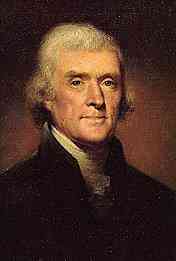To John Tyler Monticello, May 26, 1810
 DEAR SIR,
DEAR SIR,-- Your friendly letter of the 12th has been duly received. Although I have laid it down as a law to myself, never to embarrass the President with my solicitations, and have not till now broken through it, yet I have made a part of yourletter the subject of one to him, and have done it with all my heart, and in the full belief that I serve him and the public in urging that appointment. We have long enough suffered under the base prostitution of law to party passions in one judge, and the imbecility of another. In the hands of one the law is nothing more than an ambiguous text, to be explained by his sophistry into any meaning which may subserve his personal malice. Nor can any milk-and-water associate maintain his own dependance, and by a firm pursuance of what the law really is, extend its protection to the citizens or the public. I believe you will do it, and where you cannot induce your colleague to do what is right, you will be firm enough to hinder him from doing what is wrong, and by opposing sense to sophistry, leave the juries free to follow their own judgment.
I have long lamented with you the depreciation of law science. The opinion seems to be that Blackstone is to us what the Alcoran is to the Mahometans, that everything which is necessary is in him, and what is not in him is not necessary. I still lend my counsel and books to such young students as will fix themselves in the neighborhood. Coke's institutes and reports are their first, and Blackstone their last book, after an intermediate course of two or three years. It is nothing more than an elegant digest of what they will then have acquired from the real fountains of the law. Now men are born scholars, lawyers, doctors; in our day this was confined to poets. You wish to see me again in the legislature, but this is impossible; my mind is now so dissolved in tranquillity, that it can never again encounter a contentious assembly; the habits of thinking and speaking off-hand, after a disuse of five and twenty years, have given place to the slower process of the pen. I have indeed two great measures at heart, without which no republic can maintain itself in strength.
- That of general education, to enable every man to judge for himself what will secure or endanger his freedom.
- To divide every county into hundreds, of such size that all the children of each will be within reach of a central school in it.
So be it, and to yourself health, happiness and long life.
